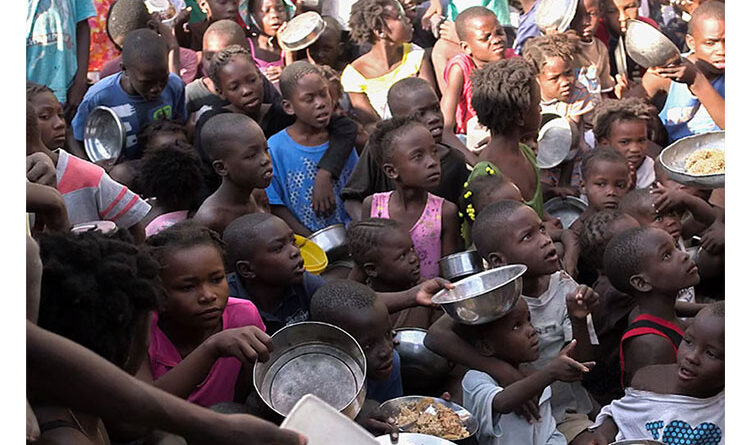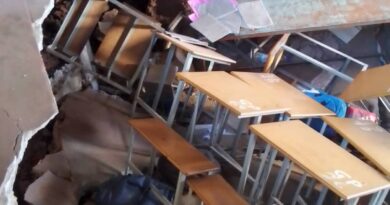MPs flee hungry villagers
LEGISLATORS in rural communities are reportedly fleeing villagers as they have no solutions for people ravaged by the El Niño-induced drought that has caused widespread food shortages in Zimbabwe and the region.
President Emmerson Mnangagwa last year declared the drought a state of national disaster and sent out a begging bowl seeking US$3 billion to help the country recover from the effects of the crisis.
The money was meant to feed over nine million Zimbabweans that are battling serious food shortages.
The food shortages are expected to continue during the lean period after Zimbabwe experienced a delayed onset of the rainy season with most areas having received below-average rainfall between October and December last year.
By last week, a significant number of areas across the country were yet to receive meaningful rains, with some farmers having been forced to replant their fields as their crops became a write-off due to high temperatures.
Also, there was a marked increase in the number of villagers failing to access maize seed due to financial constraints.
Addressing a Zanu PF inter-district meeting in Biriri, Chimanimani West MP Wilson Maphosa said he was struggling to address villagers’ needs.
The inter-district meeting was attended by Manicaland Zanu PF provincial chairperson Tawanda Mukodza, provincial youth chair Stanley Sakupwanya, Chimanimani East legislator Joshua Sacco, who was the guest of honour as a politburo member.
“We want to thank you, you have come to Chimanimani West and East for the inter-district meeting, but I want to tell you that these days, it is difficult to address villagers.
“Sometimes, I am even avoiding to address them because they are saying they are facing hunger,” Maphosa said.
“It is difficult to go and address them, but I am told other districts have received food from (the Department of) Social Welfare.
“I went to a government office in Chimanimani and I told them about the situation in my constituency and the district, but they said Social Welfare was coming very soon to assist us.”
However, sources in Zanu PF yesterday said legislators were using their own funds to feed villagers as government aid was not sufficient.
“The situation is not looking good in our villages and as an MP you are forced to fork out money to buy food for villagers.
“Some will even come at your home with children crying,” an MP, who spoke on condition of anonymity, said.
“Yes, the government is helping, but it is not sufficient for us as MPs, so we end up using our own money and some are even avoiding to go to the constituencies.”
However, Zanu PF chief whip Pupurai Togarepi said they had sufficient food reserves to feed people in the country.
“Our President Emmerson Mnangagwa has done well to feed the nation in the current drought and we are happy with the reports we are getting from our MPs as food aid is coming,” Togarepi said.
A recent World Food Programme (WFP) report stated that the transition to a weak La Niña phase later in 2024 was expected to improve rainfall prospects, albeit with some uncertainties.
“The most recent short-term forecast points to drier conditions than normal in the short term, alluding to the need for increased alertness and monitoring,” the UN agency said.
It said maize would continue to be unavailable while prices will escalate, hitting the country hard.
“Maize grain continues to be unavailable on monitored markets, while unrefined maize meal was available in an average of 95% of rural and urban markets,” WFP said.
“Prices of food on the international market saw a slight upward movement of about 0,5% according to the FAO [Food and Agricultural Organisation] price index.
“The index stood at 127.5 points. The upward movement is the largest month-on-month increase since April 2024.”
According to the Famine Early Warning System Network (FewsNet) Food Security Outlook, a crisis-level Phase 3 food insecurity will be experienced throughout the country between October 2024 and March this year.
“This period marks the pre-harvest period and peak lean season, the time when food assistance needs are expected to rise
*MPs flee hungry villagers*
https://chat.whatsapp.com/HzQJGD9ip4DALlBXVp87fR
LEGISLATORS in rural communities are reportedly fleeing villagers as they have no solutions for people ravaged by the El Niño-induced drought that has caused widespread food shortages in Zimbabwe and the region.
President Emmerson Mnangagwa last year declared the drought a state of national disaster and sent out a begging bowl seeking US$3 billion to help the country recover from the effects of the crisis.
The money was meant to feed over nine million Zimbabweans that are battling serious food shortages.
The food shortages are expected to continue during the lean period after Zimbabwe experienced a delayed onset of the rainy season with most areas having received below-average rainfall between October and December last year.
By last week, a significant number of areas across the country were yet to receive meaningful rains, with some farmers having been forced to replant their fields as their crops became a write-off due to high temperatures.
Also, there was a marked increase in the number of villagers failing to access maize seed due to financial constraints.
Addressing a Zanu PF inter-district meeting in Biriri, Chimanimani West MP Wilson Maphosa said he was struggling to address villagers’ needs.
The inter-district meeting was attended by Manicaland Zanu PF provincial chairperson Tawanda Mukodza, provincial youth chair Stanley Sakupwanya, Chimanimani East legislator Joshua Sacco, who was the guest of honour as a politburo member.
“We want to thank you, you have come to Chimanimani West and East for the inter-district meeting, but I want to tell you that these days, it is difficult to address villagers.
“Sometimes, I am even avoiding to address them because they are saying they are facing hunger,” Maphosa said.
“It is difficult to go and address them, but I am told other districts have received food from (the Department of) Social Welfare.
“I went to a government office in Chimanimani and I told them about the situation in my constituency and the district, but they said Social Welfare was coming very soon to assist us.”
However, sources in Zanu PF yesterday said legislators were using their own funds to feed villagers as government aid was not sufficient.
“The situation is not looking good in our villages and as an MP you are forced to fork out money to buy food for villagers.
“Some will even come at your home with children crying,” an MP, who spoke on condition of anonymity, said.
“Yes, the government is helping, but it is not sufficient for us as MPs, so we end up using our own money and some are even avoiding to go to the constituencies.”
However, Zanu PF chief whip Pupurai Togarepi said they had sufficient food reserves to feed people in the country.
“Our President Emmerson Mnangagwa has done well to feed the nation in the current drought and we are happy with the reports we are getting from our MPs as food aid is coming,” Togarepi said.
A recent World Food Programme (WFP) report stated that the transition to a weak La Niña phase later in 2024 was expected to improve rainfall prospects, albeit with some uncertainties.
“The most recent short-term forecast points to drier conditions than normal in the short term, alluding to the need for increased alertness and monitoring,” the UN agency said.
It said maize would continue to be unavailable while prices will escalate, hitting the country hard.
“Maize grain continues to be unavailable on monitored markets, while unrefined maize meal was available in an average of 95% of rural and urban markets,” WFP said.
“Prices of food on the international market saw a slight upward movement of about 0,5% according to the FAO [Food and Agricultural Organisation] price index.
“The index stood at 127.5 points. The upward movement is the largest month-on-month increase since April 2024.”
According to the Famine Early Warning System Network (FewsNet) Food Security Outlook, a crisis-level Phase 3 food insecurity will be experienced throughout the country between October 2024 and March this year.
“This period marks the pre-harvest period and peak lean season, the time when food assistance needs are expected to rise above normal levels,” FewsNet said.
It said food security was anticipated in April and May during the harvest time, shifting conditions to Stressed (IPC Phase 2) in some areas. Newsday
above normal levels,” FewsNet said.
It said food security was anticipated in April and May during the harvest time, shifting conditions to Stressed (IPC Phase 2) in some areas. Newsday




